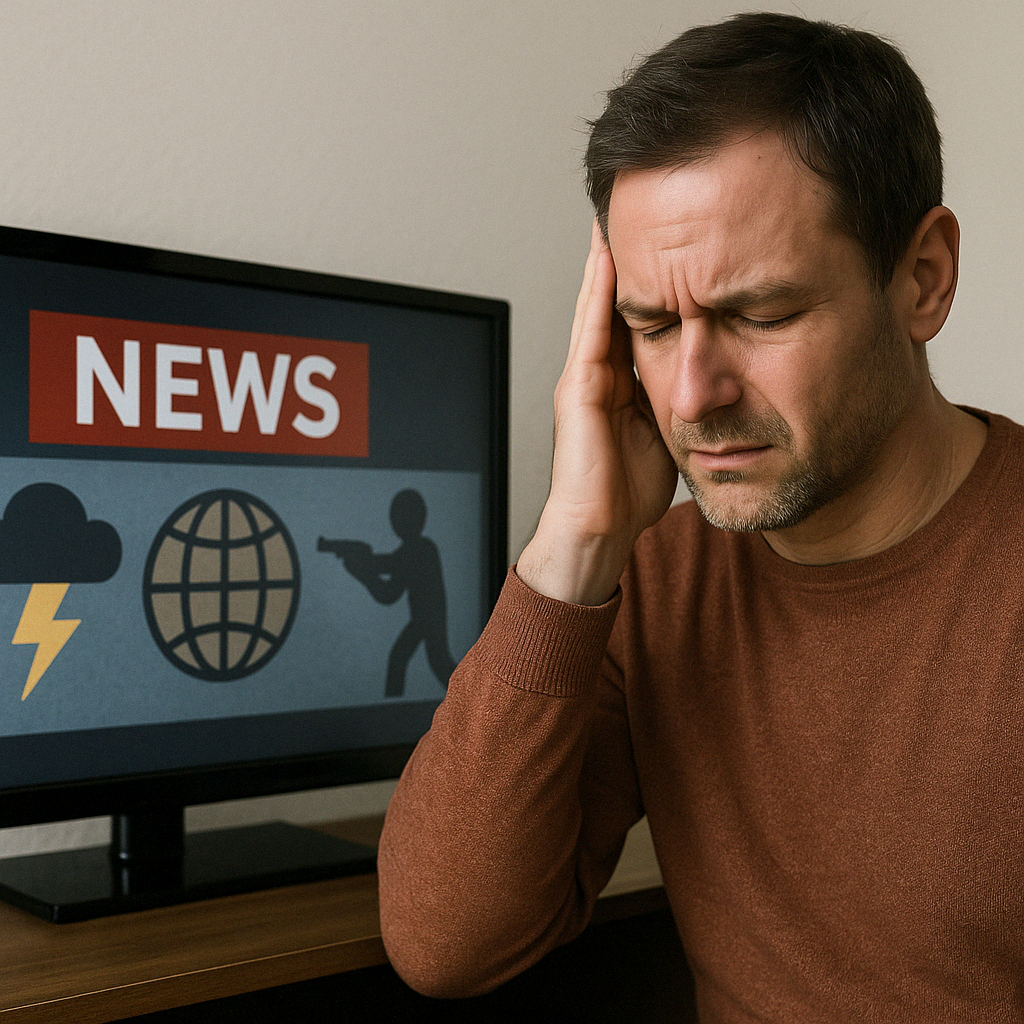Nos despertamos y lo primero que hacemos muchos de nosotros antes siquiera de levantarnos es ver el celular, abres cualquier red social o portal de noticias y ¡pum!… guerra, inflación, crisis, violencia, cambio climático, políticos echándose la culpa de los males que aquejan a su país y fulanito acaba de romper con sutanita. ¿Cómo no va a estresarnos estar informados si parece que el mundo se está incendiando…y también fulanito?
La saturación informativa es real y todos de una u otra forma la estamos viviendo en carne propia. El psicólogo Daniel Levitin autor de “The Organized Mind” explica que nuestros cerebros simplemente no están hechos para procesar esta cantidad de información tan rápido, tan seguido y tan bien (esto último lo digo yo); a eso súmale que los algoritmos no te muestran lo más importante sino lo más escandaloso. Como diría Nassim Taleb ensayista, investigador y financiero libanés naturalizado estadounidense, vivimos en una época en la que la señal es poca y el ruido es muchísimo. Y desafortunadamente no investigamos un poco más a fondo y nos tragamos todos los bulos que vemos y escuchamos en todos lados.
¿Entonces qué, dejamos de ver noticias y ya?
Pues tampoco, no exageremos. Porque tampoco se trata de convertirnos en monjes de monasterio aislados de lo que acontece en nuestra comunidad y nuestro mundo; evidentemente es importante estar informados pero hay que tener claridad en para qué nos informamos, esa es la clave de todo. Hay que distinguir entre la información que puedo usar en mi día a día, es decir la que afecta a mi circulo de influencia y por lo tanto puedo tomar acciones a partir de conocerla, y la información que sólo contamina, no me sirve y además nada puedo hacer para cambiar esos hechos porque está fuera de mi circulo de influencia.
En lo laboral por ejemplo, ¿sirve saber que el dólar subió? … pues depende, si tienes un negocio que importa o exporta artículos, definitivamente sí sirve, ahora bien, si en tu negocio no compras materiales en el extranjero o no estás pagando alguna herramienta que solo exista en otro país pues tal vez no te interese tanto (Y no me confundan con Andrea y el Negrito que estoy lejos de comulgar con sus “ideas acerca del precio del dollar”). ¿Te afecta que haya conflicto en el Medio Oriente? Quizá por la parte humana, pero si en tu colonia no hay agua desde hace dos semanas más valdría enfócarte en eso primero. Es decir, usa la información como herramienta no como castigo o cómo sabiduría dominguera para impresionar.
¿Qué podemos hacer entonces?
1. Selecciona fuentes confiables. No todo lo que parece noticia lo es, verifica, contrasta, no seas el primo que reenvía fake news por WhatsApp a diestra y siniestra.
2. Establece horarios para informarte. Como si fuera medicina, una dosis en la mañana y una ligera en la noche, pero no antes de dormir porque luego sueñas que estás atrapado en una conferencia de prensa de AMLO.
3. Aplica el principio de acción. Si una noticia te enoja transforma esa emoción en algo útil. ¿Te molesta la corrupción?, no participes en esta práctica, denuncia actos de corrupción con datos y no con chismes. En resumen: si no puedes hacer nada suéltala, dejala ir y si puedes hacer algo que impacte, hazlo.
¿Es mejor no escuchar nada?
No. Ignorar algo no hace que esto desaparezca y por el contrario ignorar algo que deberiamos de saber si nos puede generar problemas. Ahora bien, estar empapado 24/7 de todo lo que pasa en tu cuadra, en tu estado, en tu país y en el mundo tampoco te hace más útil ni más chingón, como dice el filósofo callejero “no se como se llama” ni tanto que queme al santo ni tanto que no lo alumbre.
¿Es esto nuevo o antes también pasaba?
Antes también había tragedias y medios que desinformaban eso es de todos los tiempos, la diferencia al día de hoy es que no había acceso inmediato a la información. Esa mis amigos es la pequeña gran diferencia, además ahora te enteras de las noticias de tu calle, las de tu país y las del otro lado del planeta en tu mismo teléfono celular y en el momento en que sucede. Antes si temblaba te enterabas por tu tía que vivía en Guerrero y hoy lo ves en tiempo real, con diez teorías de por qué es culpa del gobierno y 14 videos desde diferentes ángulos…esta muy cabrón.
Conclusión:
Las noticias nos estresan porque muchas veces las consumimos como adictos no como ciudadanos que buscan entender para actuar; y no se trata de dejar de ver noticias, se trata de dejar de consumirlas sin criterio y comparación. Elige los medios que sean honestos, compara la misma noticia en varios medios y actúa o suelta. Pero por favor no te conviertas en el burro que carga todos los costales del mundo cuando tú apenas puedes con el tuyo.
_____________________________________________________________________________________________
Why the News Stresses Us Out (and What You Can Actually Do About It)
We wake up, and the first thing many of us do—even before getting out of bed—is check our phones. You open any social network or news site and boom!… war, inflation, crisis, violence, climate change, politicians blaming each other for their country’s problems, and so-and-so just broke up with what’s-her-name. How wouldn’t staying informed stress us out if it feels like the world’s on fire… and so is so-and-so’s relationship?
Information overload is real, and we’re all living it in the flesh one way or another. Psychologist Daniel Levitin author of The Organized Mind explains that our brains simply aren’t built to process this much information this fast, this frequently, and this well (that last part’s mine). On top of that, the algorithms don’t show you what’s most important just what’s most scandalous. As Nassim Taleb, Lebanese American essayist and financial researcher would say: we live in a time where signal is scarce and noise is everywhere. And unfortunately, we don’t dig deeper—we just swallow all the crap we see and hear all around us.
So what, we just stop watching the news?
Well, not that either. Let’s not be dramatic. It’s not about turning into monks in a monastery, completely detached from what’s happening in our community and the world. Obviously, it’s important to stay informed—but the key is knowing why you’re staying informed in the first place. That’s the whole point. We must distinguish between the kind of information we can use in our daily lives—that is, the stuff within our sphere of influence that we can act on—and the kind that just pollutes us, serves no purpose, and we can’t change because it’s way outside our reach.
Take work, for example: is it useful to know the dollar went up? Well… it depends. If you run a business that imports or exports, then absolutely. Now, if your business doesn’t rely on buying stuff from abroad or using tools that only exist in other countries, maybe not so much. (And no, don’t confuse me with Andrea and the “Negrito”—I’m nowhere near agreeing with their takes on the dollar price.)
Does conflict in the Middle East affect you? Maybe emotionally, but if there’s been no water in your neighborhood for two weeks, you might want to deal with that first. In other words: use information as a tool, not as a punishment or Sunday trivia to impress others.
So, what can we do?
- Choose reliable sources. Not everything that looks like news is. Verify, cross-check. Don’t be that cousin who forwards fake news on WhatsApp like it’s their job.
- Set specific times to catch up. Like medicine: one dose in the morning, one light hit at night—but not right before bed, or you’ll dream you’re trapped in one of AMLO’s press conferences.
- Act on it. If a piece of news makes you angry, channel that energy into something useful. Annoyed by corruption? Don’t take part in it. Report it—backed by facts, not gossip. Bottom line: if you can’t do anything about it, let it go. And if you can do something then for God’s sake, do it.
Is it better to ignore it all?
Nope. Ignoring something doesn’t make it go away. On the contrary, ignoring what we should know can come back and bite us, but being glued 24/7 to everything happening on your street, in your state, in your country, and across the globe doesn’t make you more useful—or more badass—either. Like that street philosopher said (I don’t remember his name): not too much to burn the saint, not too little to leave him in the dark.
Is this new or has it always been like this?
There’ve always been tragedies and manipulative media—that’s nothing new. The difference today is the instant access. That my friends is the small-big difference. Now you get news from your street, your country, and the other side of the planet on the same phone and in real time.
Back in the day, if there was an earthquake your aunt in Guerrero told you. Now you see it live with ten theories blaming the government and fourteen different camera angles… it’s freaking insane.
Conclusion:
News stresses us out because we often consume it like addicts—not like citizens trying to understand and act. The goal isn’t to stop watching news—it’s to stop swallowing it without judgment. Choose honest media, compare the same story across different outlets, and either act or let it go.
But please, don’t turn into that donkey trying to carry all the world’s burdens when you’re barely making it with your own.

